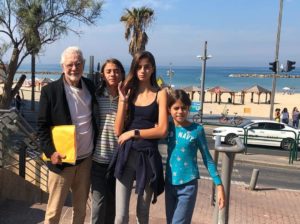Acclaimed hockey journalist Stan Fischler moves to Israel – and sees the fruits of his life’s labor
Legendary American sports broadcaster Stan Fischler, 87, is having difficulty learning the language of his newly adopted home, Israel. But one Hebrew word is as familiar to him as his own name.
For decades, New York hockey fans have called him “the maven” – Hebrew for “one who understands” and a term that has entered English via Yiddish.
It’s a fitting accolade, for Stan “The Maven” Fischler’s understanding of hockey is considered unsurpassed.
Over the course of a career spanning more than 60 years, the broadcaster has done commentary for countless games, won seven Emmy awards as well as the Lester Patrick Trophy for outstanding service to hockey, and wrote more than 100 books, many together with his late wife, Shirley, who was herself a groundbreaking sports journalist.
Just over a year ago, Fischler, a lifelong New Yorker, hung up his microphone and relocated to the Golan Heights kibbutz where his son, Simon, has been living with his own family for the past eight years.

Left to right: Ariel, Avigail, Simon, Stan, and Odel Fischler
Though retired from broadcasting, the elder Fischler continues to write about the sport. But his main job these days is to kvell at how the sport has sunk deep roots into the heart of the Middle East, and nowhere more so than in his son’s home.
The Fischler grandchildren – Odel, 15; Ariel, 13; and Avigail, 10 – are carrying on the family tradition, using their knowledge and passion to raise the sport to new heights.
Their grandfather is their inspiration, not only because of his illustrious career but because of his decision to come to Israel.
“I’m really proud of the choice he made,” Ariel told The Media Line. “He’s been living in New York all his life, and moving to a different country, culture and language is very hard.”
The closest hockey rink to the kibbutz is 40 minutes away at Canada Centre, a large multisport complex in Metula built by the United Israel Appeal of Canada. Stan makes a point of attending all of his grandchildren’s games, and many of their practices.
“To have one grandchild carry on the family hockey tradition would be amazing,” he said to The Media Line. “To have three… it boggles my mind.”
Hockey has had a presence in Israel since the 1970s, and took off with the immigration of more than a million people from the former Soviet Union beginning in 1989 – the year the Ice Hockey Federation of Israel was established.
Initially, the federation registered about 150 players, almost all of them from Russian or North American backgrounds.
Israel got its first Olympic-size rink when Canada Centre opened in 1994.
Since then, the sport has grown steadily.
“There are more and more kids,” Simon told The Media Line. “But the sport needs funding; that’s the only way to help it grow.”
He mentions programs like “Hockey in Harlem,” which helped expose the sport to a wider public in the US.
“For the game to grow in Israel, you need more programs like that,” he said.
Ariel tells The Media Line that even today, “it’s mostly Russians and some Americans and Canadians” who play in Israel. But the sport has become somewhat more diverse, with players from other backgrounds “here and there.”
Stan’s assessment of the Israeli hockey scene echoes the adage from the popular film Field of Dreams: “If you build it, they will come.”
Says Stan: “Where there are rinks [in Metula, Holon and Kfar Saba], the intensity is as great as it would be in Saskatchewan or Toronto.”
The elder Fischler says modestly that he “had nothing to do with” his grandchildren’s involvement in the sport. For this, he credits Simon, who learned the sport as a child from some of the world’s best players while tagging along with his dad to Islander practices and games.
Referring to his unique childhood, Simon says: “I didn’t realize how lucky I was. I got to go on the ice with legendary players like Billy Smith, Kelly Hrudey, Gerald Diduck and Pat LaFontaine.”
It’s true that Simon – as hockey-mad as anyone in the country – got all his children into the sport well before their grandfather immigrated. But the influence of Stan and Shirley is felt strongly in this close-knit family.
About his grandchildren, Stan gushes: “All three are prodigies in their own way. Odel, 15, is a marvelous skater and athlete. Ariel, 13, is a very intense player and very much follows the pros. He’s a Rangers fan and he studies the games. And Avigail, 10, is just a natural. She’s totally fearless.”
He compares Avigail’s instincts on the ice to those of superstar Wayne Gretzky, and notes that she holds her own against boys five years older who have learned to respect her fierce defense.
Simon agrees with his father about the children’s abilities.
“Odel is smooth skating and tough as nails,” he says. “Ariel just dominates the ice…. Avigail is rough and tough, and can read plays very well.”
Ariel has been scouted by teams in Europe.
“I’m thinking about hockey as a profession,” he told The Media Line.
Odel could go in the same direction and notes that a professional women’s league was established in the US in 2015. For now, though, she balances school and hockey with a budding modeling career, which has taken her to Switzerland for professional shoots.
According to Simon, other Israeli players lack one of the perks his children have.
“They don’t have ‘The Maven’ sitting in their living room, telling them about celebrated players like Johnny Bower or Doug Harvey… or being there when the Islanders won four consecutive Stanley Cups,” he said. “That’s what needs to be built in this country: the culture of hockey.”
Compared to many other countries, Israel lacks a strong culture of youth sports. Schools do not sponsor teams, and afterschool programs are underfunded. Among participants in popular sports like soccer, basketball and judo, relatively few children are strongly committed or competitive on an international level.
In contrast, Israel’s youth hockey program is extremely demanding.
“They’re on the ice four to five times per week. That’s a hell of a lot of ice. It’s like in Canada!” Stan says.
Odel adds: “It’s definitely not just a hobby. It’s a lifestyle. We put a lot of time and effort into it…. We have four practices per week, and then we do a lot at home, like workouts and stick-handling and working on our shots.”
A typical practice, she says, includes “ice for an hour, and then a lot of times we have ‘drylands’ where we do workouts in the gym for another hour.”
The hard work is paying off, says Simon. The level of Israeli hockey is on the rise, and teams have shown impressive achievements, for example this past April when the national team won gold at the International Ice Hockey Federation World Championship (Division II Group B) in Mexico City.

Left to right: Stan, Ariel, Odel and Avigail Fischler
Stan has been instrumental in improving the level of play both locally and nationally. He helped recruit former NHL player Bobby Holík to coach Metula’s summer program, after which Holík went on to coach the national team. Moreover, before big games, the Fischlers have had the Metula team over to their home, where Stan regaled them with anecdotes from his career.
“It brought this team together,” says Simon, “gave them a push and unified them.”
Team sports are not only about competition; they are also a social activity. But playing a “small sport” like hockey in a society where the vast majority of focus is on other sports can be difficult, particularly for teens.
“It’s kind of annoying sometimes, to talk to friends who don’t really understand it,” Ariel says. “They’ll go to a soccer game much more easily because they know the game, and not come to a hockey game because they don’t know anything about it.”
But his sister, Odel, disagrees.
“It’s not really difficult, not out of the ordinary,” she insists.
What is out of the ordinary, she says, is the fact that the Israeli youth hockey teams are co-ed. But she and her younger sister, Avigail, are not intimidated by the boys.
“The girls are just like the guys. They’re not any different, and we’re all friends,” she says.
Simon says his father “just loves hockey being played” in Israel.
“It blows his mind, really,” he proclaims. “For him, it’s a cherry on top of a very interesting cake.”